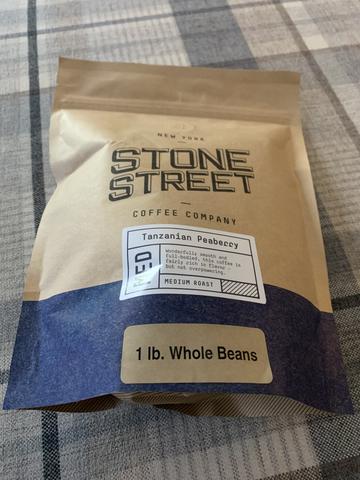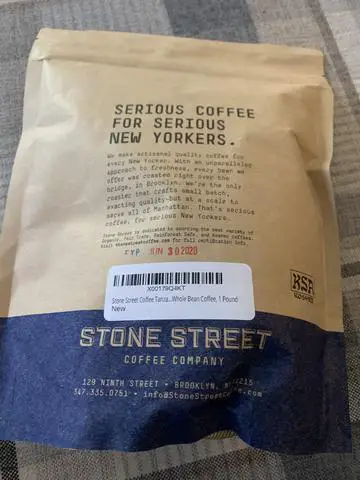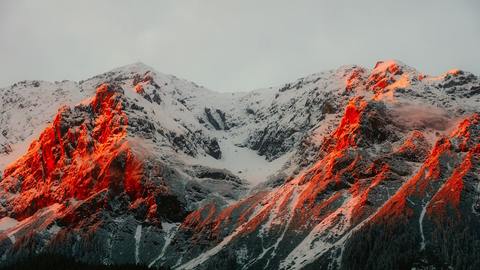For your information, if you click on a product on Jayarrcoffee.com and decide to buy it, we may earn a small commission.
Table of Contents
Stone Street Tanzania Peaberry
| Region | Mount Kilimanjaro, Tanzania |
| Acidity | Low |
| Body | Full |
| Flavor Notes | Fruit, cedar |

Stone Street’s Tanzanian Peaberry coffee is grown on the slopes of Mount Kilimanjaro. The volcanic soil and mild climate create the perfect growing conditions for high-quality coffee. While similar to Kenyan coffee, Tanzanian coffee has a much lighter acidity while retaining the full-body and rich flavor.
So what is a peaberry? A peaberry is a coffee bean that is small and round, with a cleft in the middle. Peaberry coffee has a richer flavor than oval-shaped coffee beans and only comprises about 10% of all coffee beans produced.
Stone Street is a “micro-roastery” located in Brooklyn, New York. In our article about peaberry coffee, we did a pour over taste test for Stone Street Tanzania Peaberry. We really enjoyed the fruity, jam-like flavor of this one when we tried it! Would definitely recommend!

Where To Find It
This coffee is both available and generally well reviewed online. Reviewers love the fruity, berry-like flavor and mild acidity of the peaberry beans, as well as the low price.
You May Also Like:
Some alternatives from the same region available are:
- Fresh Roasted Coffee LLV Tanzanian Peaberry. 4 stars, find it here. These beans are also grown on Mount Kilimanjaro, near the town of Moshi. The coffee sports notes of lemon, peach, and black tea.
- Volcanica Tanzania Peaberry Coffee This peaberry coffee is also grown on Mount Kilimanjaro and notes a rich body and intense flavor with mellow winy notes. These beans are medium roasted.

Two Volcanoes Gourmet Guatemala
| Region | San Marcos, Guatemala |
| Acidity | Moderate |
| Body | Full |
| Flavor Notes | Smoke, floral, chocolate |

The first coffee plant was brought to Guatemala by Jesuit priests in the 1750s because they thought it would make a great ornamental tree. Less than 50 years later, quality coffee cultivation had become a widespread agricultural endeavor for the small Central American country. Today, Guatemala is regularly recognized for some of the best quality coffee production in the world.
There are several factors that make Guatemala an ideal place to grow coffee; the climate is not too wet or humid and the soil is volcanic, with large amounts of minerals and low acidity. These conditions are well-represented at the single estate that produces Two Volcanoes Coffee.
Nestled between Tacana and Tajumulco, the two volcanoes that give this coffee company its name, this single estate is responsible for producing some of Guatemala’s best coffee. The medium roast creates a cup of coffee that is full-bodied and smoky, with hints of chocolate and subtle floral notes as well.
Overall, this is a fine coffee, but a little higher in price than some other single origin Guatemalan coffees and doesn’t particularly stand out.
Where To Find It
Online reviewers seem to like this coffee a lot, but we tend to think they overrate it somewhat. Consumers love the high-altitude coffee brewed in a french press to retain the complex flavor profile.
You May Also Like:
Some alternatives from the same region available are:
- Java Planet Guatemalan Gourmet Organic Coffee Beans available here. This organic, medium roast coffee offers the date it was roasted on every bag, ensuring you get the freshest cup possible.
- Volcanica Guatemala Antigua Coffee available here. This single-origin, medium roast hails from Antigua and provides a rich, full body. The coffee offers similar smoky flavors but also subtle hints of spicy overtones and a sweet finish.
Peet’s Arabian Mocha Sanani
| Region | Arabian Peninsula |
| Acidity | Low |
| Body | Full |
| Flavor Notes | Cocoa, dates |
Unlike the other coffees we’ve reviewed, Peet’s Arabian Mocha Java is a blend. This coffee is grown under harsh conditions in the arid mountains of the Arabian Peninsula, primarily in Yemen. Generally, mocha varieties prefer terrains with low bushes on primitive, barely-cultivated lands. Given the arid climate, the plants almost magically sprout up around oases of spring water, on terraces hewn from the rocky mountains.
These coffee beans have been harvested and produced the same way for centuries; cherries are hand-picked and dried on rooftops, then hand-milled using stone wheels to remove the hulls. The difficult and arduous process gives rise to one of the best cups of coffee on earth.

A cup of Peet’s Arabian Mocha Sanani offers low acidity, full-body, and notes of cocoa and dates.
We thought this coffee was good, but Peet’s Yosemite dos Sierras, which we looked at here, has a similar, cocoa forward taste that we preferred. An appropriate rating might be 4 stars.
Where To Find It
This coffee is available directly from Peet’s. It is roasted to order, sealed, and shipped within 24 hours.
You May Also Like
Some alternatives from the same region available are:
- Teasia Yemen Mocca Sanani. 4.4 stars, available here. This coffee has an earthy, balanced flavor with chocolatey, fruity undertones.
- Al Mokha Yemen Dar Roast. 4.3 stars, available here. This dark roast also exhibits the cocoa undertones the region is known for. In addition to the dark roast, it is also available in a medium roast. The producer highly recommends brewing in a french press to retain flavors.
3 Coffee Comparison
| Coffee | Two Volcanoes Gourmet Guatemala | Peet’s Arabian Mocha Sanani | Stone Street Tanzania Peaberry |
| Region | Guatemala | Arabian Peninsula | Tanzania |
| Acidity | Moderate | Low | Low |
| Body | Full | Full | Full |
| Flavor Notes | Smoke, floral, chocolate | Cocoa, dates | Fruit, cedar |
| Process | Washed (Wet) | Dry | Washed (Wet) |
| Roast | Medium | Dark | Light |
| Our Rating | 4.4 stars | 4.7 stars | 4.3 stars |
| Price | $18.97 (1lb) | $17.95 (1lb) on Peet’s website | $14.99 (1lb) |
